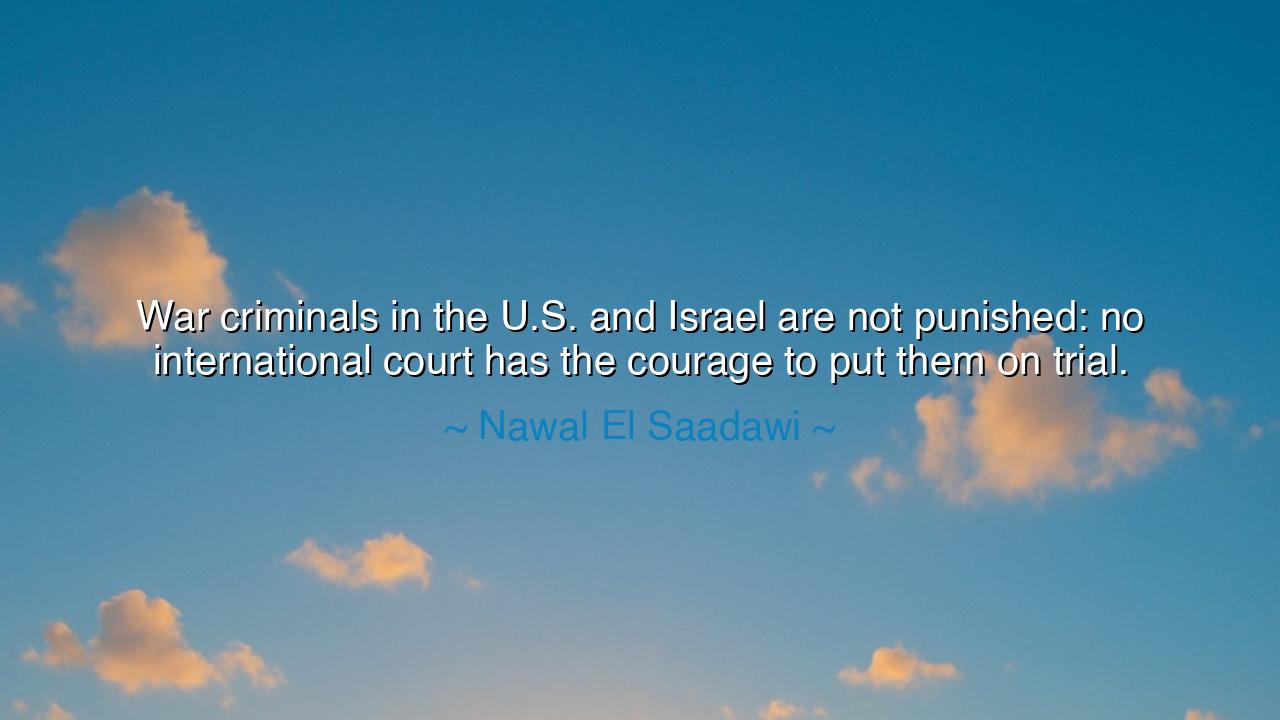
War criminals in the U.S. and Israel are not punished: no
War criminals in the U.S. and Israel are not punished: no international court has the courage to put them on trial.






“War criminals in the U.S. and Israel are not punished: no international court has the courage to put them on trial.” Thus declared Nawal El Saadawi, the Egyptian writer, physician, and fearless voice of truth, whose words burn with the fire of justice and sorrow. She spoke not from bitterness, but from the long memory of one who had seen empires justify cruelty and the mighty escape judgment. In her statement lives both accusation and lament — a cry against the imbalance of power that shapes the world, and a warning to all who place strength above morality.
To understand the heart of her words, we must first understand who she was. Nawal El Saadawi was a warrior of conscience, a woman who defied prisons, dictatorships, and the silence imposed upon the oppressed. She was not afraid to name hypocrisy where others bowed. Her quote arises from a deep moral observation: that justice, though proclaimed universal, often bends before the throne of power. The international courts, built to uphold the sanctity of law and human rights, tremble before the powerful, while the weak are made to bear the full weight of punishment. In this imbalance, she saw the betrayal of humanity’s noblest ideals.
The ancients would have called her words prophetic. For what she speaks of is not new, but eternal: the struggle between power and justice, between those who wield might and those who seek fairness. From the fall of Troy to the wars of empire, it has ever been so — that the victors write the laws and cleanse themselves of guilt. Even the philosophers of Athens, those heralds of democracy, watched their city’s leaders commit atrocities upon weaker states, all in the name of order and survival. Nawal’s cry, though modern, echoes through the corridors of history: the courage to judge the powerful is the rarest courage of all.
Consider the tale of Socrates, who, though innocent, was condemned to death by his own city for speaking truth to authority. He drank the hemlock calmly, saying it was better to die for justice than to live in deceit. The same spirit lives in El Saadawi’s words. She too knew that truth often stands alone, surrounded by those who fear its glare. The international courts she condemns are not merely buildings or institutions, but symbols of humanity’s conscience — and when conscience bows to politics, it becomes hollow. Her quote is not simply political, but moral: it asks, what good is law without courage?
Her reference to the United States and Israel is not hatred, but indictment — an indictment of a global system where nations that proclaim liberty and human rights often commit violence in their name. She saw the destruction of lands, the deaths of innocents, and the silence of the powerful. And she asked the question few dare to ask: Who judges the judge? Who punishes the powerful? When justice becomes selective, it ceases to be justice. In this, El Saadawi exposes a wound that bleeds not only through nations, but through all human history — the wound of impunity.
Her words challenge us not to despair, but to awaken. She reminds us that courage is not the absence of fear, but the will to confront it — especially when the truth is dangerous. If the courts of men will not stand for the weak, then the court of the human conscience must rise in their place. It is the duty of every citizen, every thinker, every artist and teacher to speak truth where institutions falter. For justice, like a fire, must be kindled by hearts when the torches of governments grow dim.
Let this then be the lesson: do not look to power for righteousness, for power often fears it. Look instead to conscience, to those who dare to speak when silence is safer. As the ancients said, the measure of a civilization is not in its wealth, but in the justice it grants to the powerless. El Saadawi’s words are not merely condemnation — they are a call to courage, a reminder that the moral duty of humankind is to hold even the mighty accountable.
So remember her wisdom, O listener of the ages: justice without courage is an empty crown. Fear not to question, fear not to stand, and fear not to demand that law serve the soul, not the sword. For as long as humanity dares to speak truth to power, there remains hope that one day the strong, too, will kneel before justice — and not before their own reflection.






AAdministratorAdministrator
Welcome, honored guests. Please leave a comment, we will respond soon